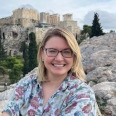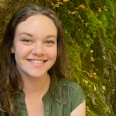Caroline Carter is a Ph.D. candidate within the Program of Mediterranean Art and Archaeology in the Department of Art at the University of Virginia. Previously, she earned her B.A. in Classics and Religious Studies at the University of North Carolina at Chapel Hill (2014) and her M.A. in Classical Archaeology at the University of Arizona (2019).
During her fellowship period, Caroline will be based at the National and Kapodistrian University of Athens, working under the mentorship of Dimitris Plantzos, Professor of Classical Archaeology in the Department of History and Archaeology. She will be conducting essential on-site, museum, and library research for her dissertation, which focuses on nearly 30 caves within the city of Athens and the regional countryside of Attica that were previously excavated and present evidence for religious ritual activity circa 750-300 BCE. Driven by an innovative and interdisciplinary methodological approach, she reexamines the ancient evidence from and about the caves (including literature, inscriptions, archaeological materials, and architectural embellishments) and takes into consideration the surrounding natural and built environment. Ultimately, she argues that these caves should be conceptualized in modern scholarship as proper sanctuary spaces that were an integral part of the Athenian and broader regional religious landscape. These cave sanctuaries demonstrate the often-underemphasized role and value of the natural environment within ancient Greece and shed light on non-elite communities (namely women and rural herders and hunters) that are often not well-preserved in the archaeological record.
Previously, Caroline was the 2023-2024 Jacob Hirsch Fellow at the American School of Classical Studies at Athens. Additionally, she received support for her dissertation project and general academic education from the American Society of Overseas Research, American Philosophical Society, and Hellenic Cultural Foundation, as well as from the University of Virginia, including the Department of Art, Interdisciplinary Archaeology Program, Praxis Program in Digital Humanities within the Scholars’ Lab, Graduate School of Arts and Sciences Council, Center for Global Inquiry + Innovation, and Raven Society. At present, she is a Trench Supervisor at the Mt. Lykaion Excavation and Survey Project (Greece) and Digital Data Supervisor for the Coastal Caesarea Archaeological Project (Israel).


